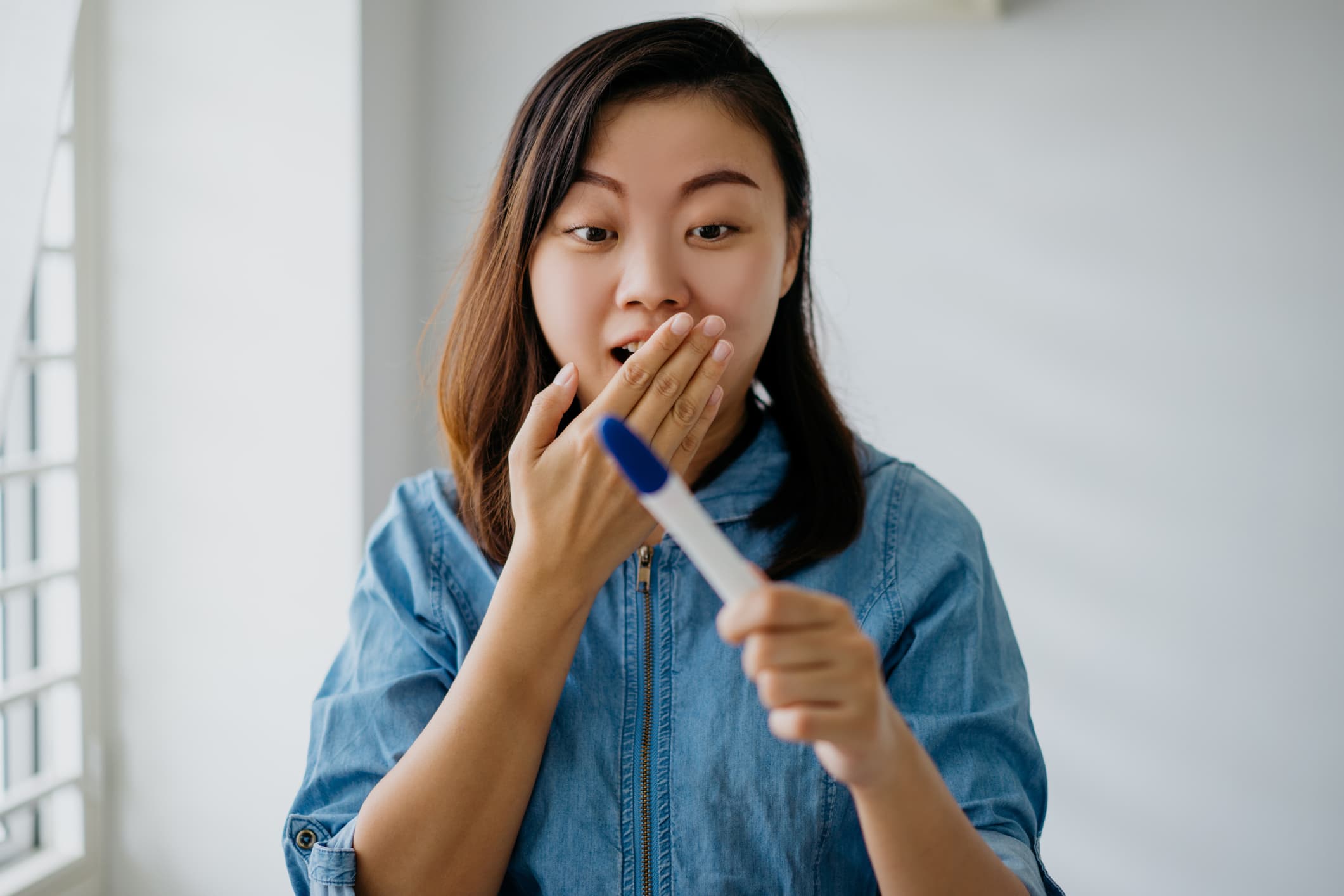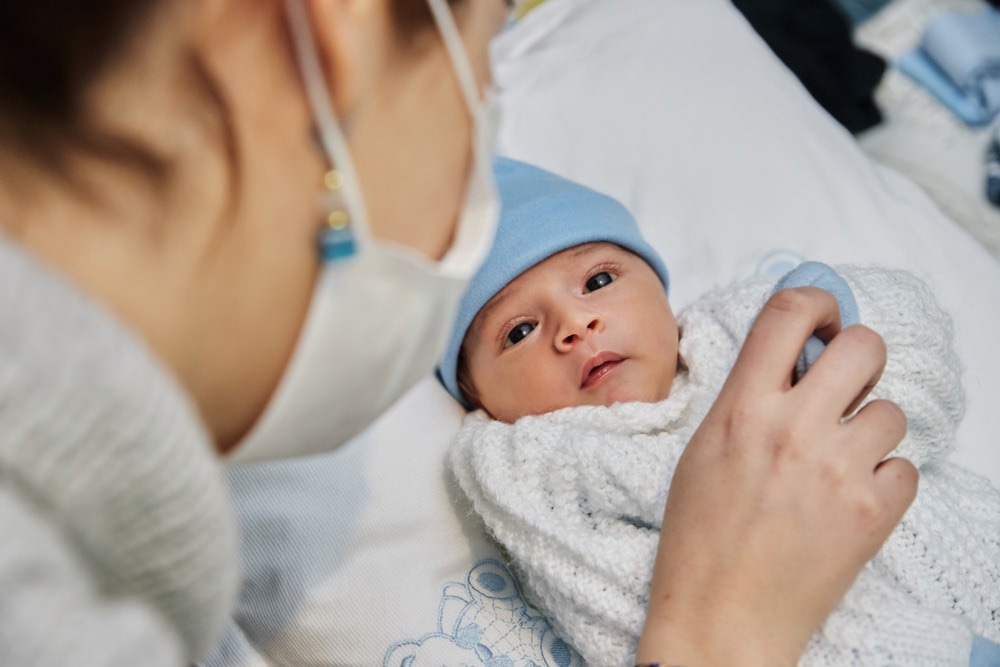Whether you have been trying for a baby for a while or have a sneaking suspicion you might be pregnant, waiting to take a pregnancy test can be agonizing. However, pregnancy tests can be expensive, and you want to ensure accurate results. Taking a test too soon can be inconclusive, give you a false negative, or force you to continue testing for a precise result.
You want to know if you are pregnant as soon as possible, but you do not want to risk getting a false negative. You might wonder when is the best time to take a pregnancy test. Should you wait for symptoms or a particular day? Are at-home tests accurate, and how do they even work?
How Pregnancy Tests Work
Home pregnancy tests detect human chorionic gonadotropin (hCG) in your urine. A fertilized egg releases hCG after it implants into the uterine lining. So, to get a positive pregnancy test, sperm not only must fertilize an egg, but the egg must also implant into the uterus.
When an embryo begins releasing hCG, it first shows up in the mother’s bloodstream and then in her urine. Home pregnancy tests detect the hCG hormone in urine. To use a pregnancy test at home, a woman may either collect her urine in a cup, dip a test strip into it, or pee directly on the test. Two lines appear if the test is positive, whereas only the control line will appear if the test is negative. Any line, no matter how faint, indicates a positive pregnancy test.
Digital home pregnancy tests use the same method and technology, but they read the lines for you and give you a definitive result of “pregnant” or “not pregnant” instead of you having to interpret the line or lines.
How Early Can You Take a Pregnancy Test?
Remember that implantation must occur before the pregnancy hormone hCG is secreted, and hCG is what triggers a positive pregnancy test. Implantation occurs between six to eight days after ovulation and fertilization of an egg.1
It can take three to four additional days for hCG to rise high enough and for the levels to be detectable in blood and urine. So, the earliest you can potentially get a positive pregnancy test is about nine days after ovulation.1
Suppose fertilization or implantation occurs on the later side of these windows. In that case, it is possible to be pregnant but not get a positive pregnancy test until much closer to your missed period or 12 to 14 days after ovulation. You can take a pregnancy test earlier than that, but if you test too early, a negative pregnancy test may not be accurate.
If you were not tracking ovulation, a good rule of thumb is to take a pregnancy test once your period is late or missed. If a woman is indeed pregnant, 98 percent of pregnancy tests will be positive by the day of her missed period.1
What Time of Day Should You Take a Pregnancy Test?
Taking a pregnancy test first thing in the morning with your first void of the day is best. This is when your urine is the most concentrated since you likely have not been drinking and peeing as frequently throughout the night. More concentrated urine means that hCG will be less diluted by water, and the test may pick up a positive result sooner.
You can take a pregnancy test later in the day, especially if you are closer to or past your missed period when hCG should be high enough, no matter your urine’s dilution or time of day. However, taking a pregnancy test just nine days after ovulation in the middle of the afternoon will probably not result in a positive, even if you are pregnant.
If you do not want to wait to test until the following day, make sure not to drink large amounts of liquid in the hours before testing, which can dilute your urine sample and give you a false negative.2
Taking a Pregnancy Test Because of Symptoms
Many early pregnancy symptoms are caused by the hormone progesterone, which rises in the second half of your cycle after ovulation, regardless of whether you are pregnant. This explains why many women complain that their premenstrual symptoms (PMS) match their pregnancy symptoms in the early days.3
If your pregnancy hormones are high enough to cause symptoms, they should be high enough to register a positive home pregnancy test. Suppose you are experiencing pregnancy symptoms such as breast tenderness, bloating, nausea, and frequent urination, and your period is nearly due or past due. In this case, a pregnancy test would likely be accurate by this time.
Early Testing and Multiple Tests
Some women like to take pregnancy tests daily, starting around nine days post-ovulation. This may provide a better idea of when implantation occurred based on when you get your first positive result. In some cases, this can help with pregnancy dating and due-date calculations.
Serial pregnancy testing like this also provides some women comfort—they like to see their pregnancy test lines darken daily as their hCG rises. However, it is important to note that home pregnancy tests only measure whether hCG is present, not how much hCG is present. Although it can be reassuring to see home pregnancy test lines darken, these are unreliable measures of your hormones rising.2
For other women, taking multiple tests causes additional anxiety, and they prefer to wait until their missed period and rely on the results of just one or two tests. After all, if you are not pregnant, you will eventually get your period.
Pregnancy tests today are sensitive and accurate, so if you wait until your missed period to take a test, there is little need to take multiple tests. False positive pregnancy tests are rare, but if you receive a positive test, you should reach out to your provider, who may do another test in their office to confirm.1
If you receive a negative test and you still do not get your period, it is a good idea to take another test a few days to a week later.2
When to Get a Blood Pregnancy Test
In most cases, a blood pregnancy test is not necessary because home tests are sensitive and accurate. However, there are a few circumstances when your provider may think it is a good idea to check your blood for pregnancy hormones.
Late Period and Negative Tests
If your period is over a week late and you are getting negative home tests, it may be a good idea to follow up with a blood test. Your doctor may also want to look at other things in your blood for the causes of your delayed period.
Fertility Treatments
If you are going through fertility treatments, your doctor may monitor hCG levels in your blood because many fertility medications and shots contain hCG, and they can cause a false positive home pregnancy test. However, if your hCG levels continue to rise, you are likely pregnant!
Trend Hormone Values
Another reason to get a blood pregnancy test is if you or your provider would like to trend your hormone values instead of saying a simple “yes” or “no” to whether you’re pregnant. Urine pregnancy tests detect whether hCG is present but not how much. If your provider suspects your hCG is not rising as it should, they may want to draw serial blood pregnancy tests to trend numerical values. Unfortunately, this may be the case with ectopic pregnancy or miscarriage.
It can take a lot of willpower to wait for a pregnancy test when you might be pregnant. If seeing an early negative is not going to break your heart, there is no harm aside from cost and disappointment in testing early. However, your results may not be accurate until 12 to 14 days after ovulation or the day of your missed period.
While home pregnancy tests are accurate when taken at the right time, reaching out to your provider is always a good idea if you are unsure whether you are pregnant. In the meantime, try to find some patience (easier said than done!), and rest assured that you will know soon enough whether you have a little one on the way!

 PARENTING TIPS
PARENTING TIPS PREGNANCY
PREGNANCY BABY CARE
BABY CARE TODDLERS
TODDLERS TEENS
TEENS HEALTH CARE
HEALTH CARE ACTIVITIES & CRAFTS
ACTIVITIES & CRAFTS


